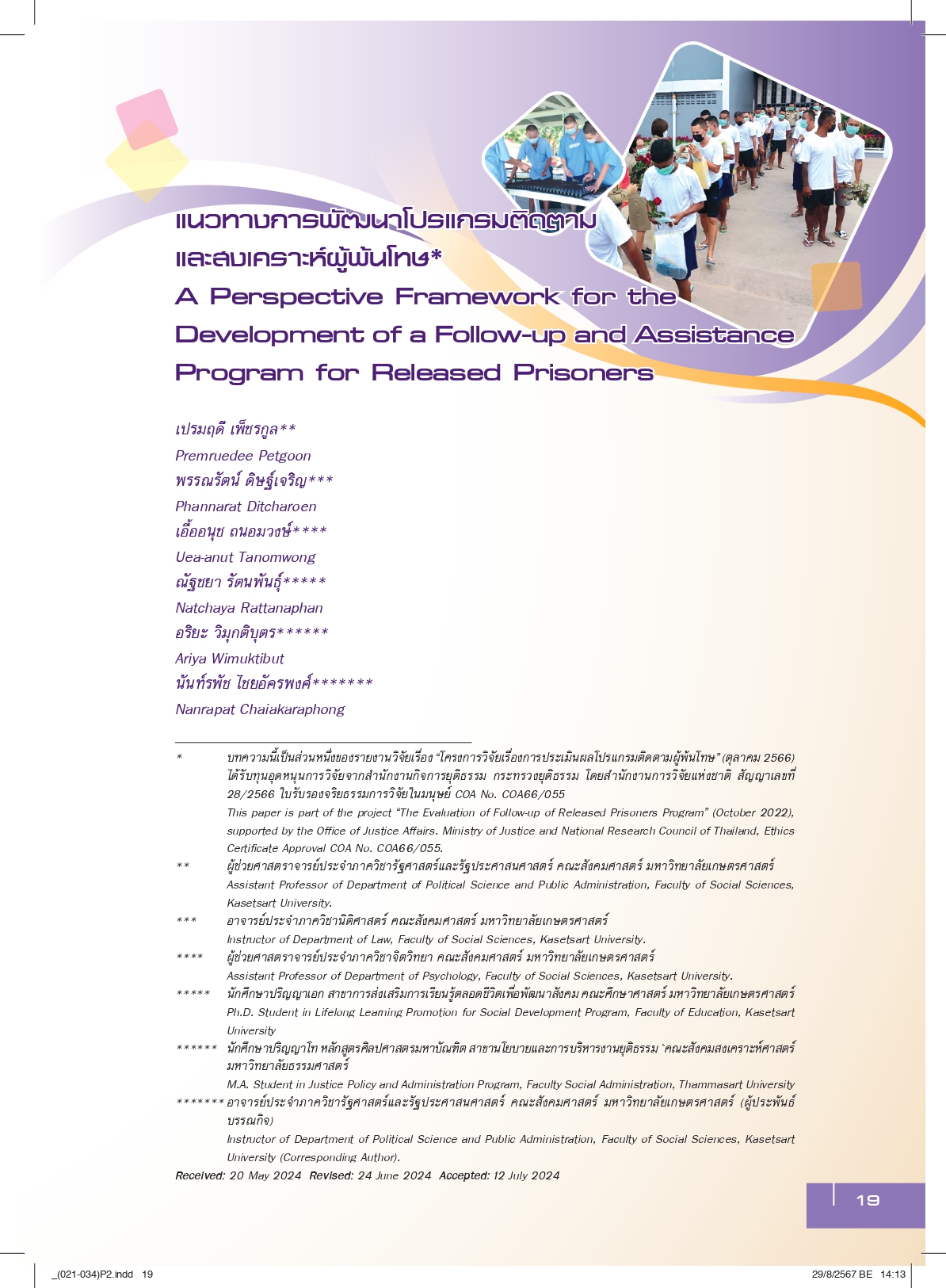แนวทางการพัฒนาโปรแกรมติดตามและสงเคราะห์ผู้พ้นโทษ
Main Article Content
บทคัดย่อ
บทความวิจัยฉบับนี้เป็นส่วนหนึ่งของโครงการวิจัยเรื่อง “การประเมินผลโปรแกรมติดตามผู้พ้นโทษ”ซึ่งมีวัตถุประสงค์เพื่อพัฒนาโปรแกรมติดตามและสงเคราะห์ผู้พ้นโทษ และรวบรวมฐานข้อมูลเครือข่าย เพื่อสร้างกระบวนการให้ความช่วยเหลือสงเคราะห์ผู้พ้นโทษอย่างเป็นระบบ งานวิจัยนี้เป็นงานวิจัยเชิงคุณภาพ เก็บข้อมูลกับกลุ่มตัวอย่างจำนวน 30 คน ประกอบด้วย ผู้บริหารและผู้ปฏิบัติงานของกรมราชทัณฑ์ หน่วยงานเครือข่ายและสถานประกอบการ องค์กรและหน่วยงานเครือข่ายที่เกี่ยวข้องกับงานด้านการติดตามหลังปล่อยและการสงเคราะห์ผู้พ้นโทษ ซึ่งความเห็นที่ได้จากกลุ่มตัวอย่างนำมาพัฒนาโปรแกรมโดยคณะผู้เชี่ยวชาญในการพัฒนาระบบแอปพลิเคชันเพื่อช่วยเหลือและสงเคราะห์ผู้พ้นโทษ ประกอบด้วย การสมัครงานออนไลน์ การประเมินสภาวะอารมณ์ ภารกิจเพื่อชุมชน หลักสูตรฝึกอบรม เป็นต้น จากผลการวิจัย พบว่า กลุ่มตัวอย่างส่วนใหญ่เห็นว่าแอปพลิเคชันมีความน่าสนใจ ไม่ซับซ้อน ง่ายต่อการเข้าใช้งาน อีกทั้งเป็นแรงบันดาลใจในการดำเนินชีวิตให้กับผู้ที่กำลังจะได้รับการปล่อยตัวและผู้พ้นโทษ ดังนั้นการสนับสนุนการใช้แอปพลิเคชันเพื่อให้เกิดความต่อเนื่องและยั่งยืน ภาครัฐหรือหน่วยงานที่เกี่ยวข้องจึงควรมีการประกาศใช้แอปพลิเคชันอย่างเป็นทางการ พร้อมทั้งจัดทำความร่วมมือระหว่างกระทรวงยุติธรรมและหน่วยงานเครือข่าย
Article Details

อนุญาตภายใต้เงื่อนไข Creative Commons Attribution-NonCommercial-NoDerivatives 4.0 International License.
ต้นฉบับที่ได้รับการตีพิมพ์ในวารสาร เป็นลิขสิทธิ์ของวารสารกระบวนการยุติธรรม แต่ความคิดเห็นที่ปรากฏในเนื้อหาของบทความในวารสารกระบวนการยุติธรรม ถือเป็นความรับผิดชอบของผู้เขียนแต่เพียงผู้เดียว
เอกสารอ้างอิง
Computer-Related Crime Act, B.E. (No 2) 2560. (2017, January 24). Royal Thai Government gazette. No. 134 Chapter 10 Gor. pp. 24-35.
Electronic Transaction Act, B.E. (No 4) 2562. (2019, May 22). Royal Thai Government gazette. No. 136 Chapter 67 Gor. pp. 203- 207.
National Research and Innovation Policy Council. (2017). 20-year Research and Innovation Strategic Plan (B.E. 2560-2579). Cocoon & Co.
Official Information Act, B.E. 2540 (1997, September 10). Royal Thai Government gazette. No. 114 Chapter 46 Gor. pp. 1-16.
Premruedee Petgoon, et al. (2020). The Development of Post-Release Follow-up Processes and Assistance or Support System for Ex-prisoners. National Research Council of Thailand (NRCT).
Premruedee Petgoon, et al. (2021). Report on Activities to Promote and Support Research and Innovation: Applying the Online Application for Ex-Prisoner’s Lifestyle. National Research Council of Thailand (NRCT).
Premruedee Petgoon, et al. (2023). The Evaluation of Follow up of Released Prisoners Program. Office of Justice Affair. Ministry of Justice.
Personal Data Protection Act, B.E. 2019. (2562, May 27). Royal Thai Government gazette. No. 136 Chapter 69 Gor. pp. 52 - 95.
Rehabilitation of Offenders Act 1974. (1794, July 31). The Parliament of the United Kingdom. Chapter 53. pp. 1-17.
The United Nations Standard Minimum Rules for the Treatment of Prisoners (the Nelson Mandela Rules). (2015, December 17). General Assembly Resolution 70/175.
United Nations Standard Minimum Rules for Non-Custodial Measures (The Tokyo Rules). (1990, December 14). General Assembly Resolution 45/110.
UNODC. (2018). Introductory Handbook on The Prevention of Recidivism and the Social Reintegration of Offenders. United Nations.


